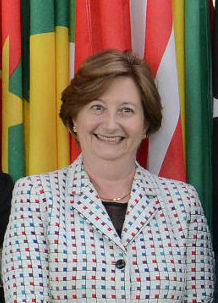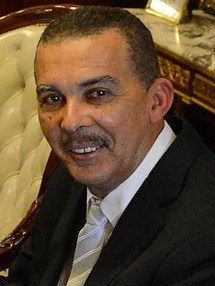
The International Criminal Court is an intergovernmental organization and international tribunal seated in The Hague, Netherlands. It is the first and only permanent international court with jurisdiction to prosecute individuals for the international crimes of genocide, crimes against humanity, war crimes and the crime of aggression. The ICC is distinct from the International Court of Justice, an organ of the United Nations that hears disputes between states.

The Rome Statute of the International Criminal Court is the treaty that established the International Criminal Court (ICC). It was adopted at a diplomatic conference in Rome, Italy on 17 July 1998 and it entered into force on 1 July 2002. As of February 2024, 124 states are party to the statute. Among other things, it establishes court function, jurisdiction and structure.

The states parties to the Rome Statute of the International Criminal Court are those sovereign states that have ratified, or have otherwise become party to, the Rome Statute. The Rome Statute is the treaty that established the International Criminal Court, an international court that has jurisdiction over certain international crimes, including genocide, crimes against humanity, and war crimes that are committed by nationals of states parties or within the territory of states parties. States parties are legally obligated to co-operate with the Court when it requires, such as in arresting and transferring indicted persons or providing access to evidence and witnesses. States parties are entitled to participate and vote in proceedings of the Assembly of States Parties, which is the Court's governing body. Such proceedings include the election of such officials as judges and the Prosecutor, the approval of the Court's budget, and the adoption of amendments to the Rome Statute.

The eighteen judges of the International Criminal Court (ICC) are elected for nine-year terms by the member-countries of the court. Candidates must be nationals of those countries and they must "possess the qualifications required in their respective States for appointment to the highest judicial offices".
Amendments to the Rome Statute of the International Criminal Court must be proposed, adopted, and ratified in accordance with articles 121 and 122 of the Statute. Any state party to the Statute can propose an amendment. The proposed amendment can be adopted by a two-thirds majority vote in either a meeting of the Assembly of States Parties or a review conference called by the Assembly. An amendment comes into force for all states parties one year after it is ratified by seven-eighths of the states parties. However, any amendment to articles 5, 6, 7, or 8 of the Statute only enters into force for states parties that have ratified the amendment. A state party which ratifies an amendment to articles 5, 6, 7, or 8 is subject to that amendment one year after ratifying it, regardless of how many other states parties have also ratified it. For an article 5, 6, 7, or 8 amendment, the Statute itself is amended after the amendment comes into force for the first state party to ratify it. Amendments of a purely institutional nature enter into force six months after they are approved by a two-thirds majority vote in either a meeting of the Assembly of States Parties or a review conference.
Six judges of the International Criminal Court were elected during the 10th session of the Assembly of States Parties to the Rome Statute of the International Criminal Court in New York between 12 and 21 December 2011. The judges elected, Anthony Carmona of Trinidad and Tobago, Miriam Defensor Santiago of the Philippines, Chile Eboe-Osuji of Nigeria, Robert Fremr of the Czech Republic, Olga Venecia Herrera Carbuccia of the Dominican Republic and Howard Morrison of the United Kingdom, took office on 11 March 2012.

Silvia Alejandra Fernández de Gurmendi is an Argentine lawyer, diplomat and judge. She was a judge at the International Criminal Court (ICC) from 18 November 2009 to 10 March 2018 and was the first woman President of the ICC from March 2015 to March 2018. In 2020 she was elected to serve as President of the Assembly of States Parties to Rome Statute of the International Criminal Court for the twentieth to twenty-second sessions (2021-2023).
A special election for two judges of the International Criminal Court was held during the 8th session of the Assembly of States Parties to the Rome Statute of the International Criminal Court in The Hague on 18 November 2009.
An ordinary election for six judges of the International Criminal Court was held during the resumption of the 7th session of the Assembly of States Parties to the Rome Statute of the International Criminal Court in New York on 19 and 20 January 2009.
A special election for three judges of the International Criminal Court was held during the 6th session of the Assembly of States Parties to the Rome Statute of the International Criminal Court in New York on 30 November and 3 December 2007.
An ordinary election for six judges of the International Criminal Court was held during the resumption of the 4th session of the Assembly of States Parties to the Rome Statute of the International Criminal Court in New York on 26 January 2006.
An ordinary election for the first full bench of 18 judges of the International Criminal Court was held during the first resumption of the 1st session of the Assembly of States Parties to the Rome Statute of the International Criminal Court in New York between 3 and 7 February 2003.

Anthony Thomas Aquinas Carmona is a Trinidadian politician who was the fifth President of Trinidad and Tobago from 2013 to 2018. Previously, he was a High Court Judge at the Supreme Court of Trinidad and Tobago, and he served as a Judge of the International Criminal Court from 2012 to 2013.
Six judges of the International Criminal Court were elected during the 13th session of the Assembly of States Parties to the Rome Statute of the International Criminal Court held from 8 to 17 December 2014 in New York. The judges were elected for terms of nine years and took office on 11 March 2015.
A special election for one judge of the International Criminal Court was held during the 12th session of the Assembly of States Parties to the Rome Statute of the International Criminal Court which took place in The Hague from 20 to 28 November 2013.
A special election for one judge of the International Criminal Court was held during the resumption of the 13th session of the Assembly of States Parties to the Rome Statute of the International Criminal Court which took place in The Hague from 24 to 25 June 2015.
Bertram Schmitt is a German jurist. He was a judge at the Bundesgerichtshof and has been a judge of the International Criminal Court since 2015.
Six judges of the International Criminal Court were elected during the 16th session of the Assembly of States Parties to the Rome Statute of the International Criminal Court held from 4 to 14 December 2017 in New York. The judges were elected for terms of nine years and took office on 11 March 2018.
Six judges of the International Criminal Court were elected during the 19th session of the Assembly of States Parties to the Rome Statute of the International Criminal Court held from 7 to 17 December 2020 in New York. The judges were elected for terms of nine years and took office on 11 March 2021.




